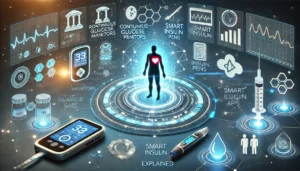“`html
Revolutionizing Diabetes Care: The Rise of Smart Insulins
Diabetes management has come a long way, from the discovery of insulin in the 1920s to the development of continuous glucose monitors and insulin pumps. Today, as technology continues to advance, the concept of smart insulins could potentially transform diabetes care entirely, offering hope for real-time blood sugar management. This blog post delves into how smart insulins are changing the landscape of diabetes treatment and what that means for patients across the globe.
Understanding the Basics: What are Smart Insulins?
Smart insulins, often referred to as “glucose-responsive insulins,” are an innovative type of insulin designed to work in tandem with the body’s natural needs. The idea is that they will automatically release insulin in response to rising blood glucose levels and reduce the risk of hypoglycemia. Here’s what sets them apart:
- Automatic Adjustment: Smart insulins can theoretically respond dynamically to fluctuations in blood sugar, providing a tailored insulin dosage when needed.
- Reduces Human Error: With traditional insulin injections, the chances of miscalculation are higher, while smart insulins aim to minimize incorrect dosing.
- Potential for Reduced Burden: Daily life for many with diabetes is a careful juggling of calculations surrounding blood sugar levels, carbohydrates intake, and insulin dosing. Smart insulins could reduce this cognitive load.
The Science Behind Smart Insulins
The science of smart insulins is as fascinating as it is complex. Researchers are working on developing insulin that can activate or deactivate in response to glucose levels. Here are a few approaches currently under investigation:
- Polymeric Micelles: Insulin encapsulated within biodegradable polymers that break down when exposed to high glucose concentrations, releasing insulin as needed.
- Enzyme-Linked Inhibition: Utilizing nanotechnology and enzymes that degrade insulin inhibitors in response to glucose levels.
- Glucose-Binding Molecules: Utilizing specific molecules that bind to glucose, triggering a chain reaction that releases insulin.
These technologies are still largely experimental but demonstrate the exciting potential for a revolution in how diabetes is managed.
The Current Development Status of Smart Insulins
As of today, smart insulins are not yet available commercially, with most research still in the clinical or preclinical trial phases. Despite the challenges, significant progress is being made:
- Several research institutions and biotech companies are working rigorously to bring these insulins to market.
- Studies show potential in reducing hypoglycemic events and improving overall glucose control.
- Innovations in synthetic biology and nanotechnology are rapidly advancing, providing new tools for smart insulin design.
While it may take several more years before these insulins are available to the public, each breakthrough pushes us closer to making them a reality.
Implications for Diabetes Care
The implications of smart insulin technology extend beyond just convenience. Here are some potential benefits:
- Improved Quality of Life: With less need for constant monitoring and adjusting, people with diabetes might enjoy a more flexible lifestyle.
- Increased Compliance: Easier management could lead to better adherence to treatment regimens.
- Healthcare Savings: Fewer complications could mean reduced healthcare costs for both patients and providers.
Challenges and Considerations
Despite the promising potential, several challenges remain:
- Cost of Development: The research and development of smart insulins require significant financial investment.
- Regulatory Hurdles: These new types of insulins will need to undergo rigorous testing and approval processes.
- Patient Acceptance: Like any new medical technology, there may be initial hesitance to adopt these new solutions.
Addressing these challenges will be crucial for the successful integration of smart insulins into mainstream diabetes management.
Looking Towards the Future
The future of diabetes care appears brighter with every step forward in smart insulin development. With the potential to significantly change how diabetes is managed, smart insulins promise to offer independence and freedom beyond what traditional insulin therapies can provide. As research advances, the prospect of real-time blood sugar control becomes an increasingly attainable reality, heralding a new era of diabetes management.
Stay tuned for further updates as the medical community continues to explore these exciting advancements. In the meantime, consult with healthcare professionals about any new developments in diabetes care suited to your specific needs.
“`
Remember to keep an eye on developing research and consult medical professionals for personalized advice on diabetes management.



